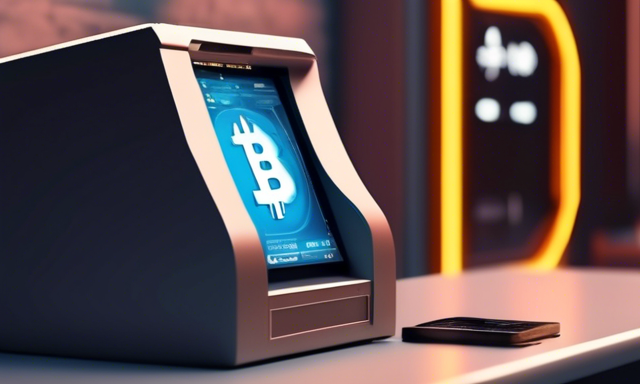Understanding the Risks and Opportunities of Bitcoin ATMs 💰
Bitcoin ATMs are becoming increasingly common in the United States. However, along with their rise comes growing concerns about their security and potential for scams. This year, discussions highlight the vulnerabilities that these machines face in the rapidly evolving cybersecurity landscape.
Vulnerability of Bitcoin ATMs 🚨
Bitcoin ATMs function similarly to traditional cash ATMs, featuring PIN entry and withdrawal fees. However, their high value makes them attractive targets for cybercriminals. Unlike a conventional ATM that might blend into its surroundings, a bitcoin ATM draws more attention from malicious actors.
Experts have pointed out that these machines are especially prone to both physical and digital threats. Timothy Bates, a clinical professor of cybersecurity at the University of Michigan, stated, “It is evident that these machines attract risks due to their unique vulnerabilities.”
One of the significant concerns surrounding bitcoin ATMs is the potential for malware attacks. Cybercriminals might install harmful software to capture private information, steal funds, or manipulate transactions. This is particularly worrisome for ATMs that do not receive regular software updates or security patches. Network vulnerabilities also pose a significant risk. Bates notes, “If the machine’s network communications are not securely managed, hackers can siphon data or gain unauthorized access.”
Government Alerts on Increasing Scams 🚫
The dangers of bitcoin ATMs are further compounded by an alarming increase in scams. The Federal Trade Commission reported that scam incidents linked to these machines have surged by 1,000% since 2020.
Interestingly, the attributes that make bitcoin appealing—its decentralized, permission-less, and immutable nature—also contribute to its risks. Joe Dobson, a principal analyst at Mandiant, explains that once a transaction occurs, it cannot be reversed. This lack of oversight means that anyone can operate a bitcoin ATM, leading to the proliferation of fraudulent machines.
Traditional banking methods might offer reversible transactions to undo mistakes. In the case of bitcoin ATMs, however, such protections do not exist. Dobson elaborated, “If a malicious actor compromises an ATM, they can change the receiving wallet address, ultimately swindling users.”
New Challenges for Bitcoin ATMs 🔍
Bitcoin ATMs also introduce modern threats not commonly encountered with traditional ATMs. Many require personal information like identification or Social Security numbers to comply with Know Your Customer (KYC) regulations. This data can be at risk if the ATM is hacked.
In Middletown, Ohio, a Bitcoin Depot ATM sits side by side with traditional cash ATMs in a convenience store. Sai Patel, who manages the shop, mentions that the bitcoin ATM sees limited use, with perhaps one customer per month. He often finds himself explaining the process, especially to seniors—a demographic particularly targeted by scammers.
Beware of Scams 📉
Patel recounted a concerning incident involving an elderly woman who, influenced by misinformation, attempted to deposit a significant amount into the bitcoin machine. Recognizing potential fraud, he intervened to prevent her from losing her savings.
Alice Frei, chief of security and compliance at a blockchain consulting agency, underscores the costly implications of bitcoin ATM fraud. “Cryptocurrencies facilitate anonymous transactions, allowing criminals to move funds with little traceability,” she remarked. This anonymity is often exploited, with many scams orchestrated from offshore locations where regulatory reach is limited.
Measures to Stay Safe from Scams 🛡️
Frei advises users to adopt a cautious approach when engaging with bitcoin ATMs. Being skeptical about requests for payment through these machines is critical since legitimate businesses typically do not demand payment via bitcoin.
To mitigate risks, consider the following steps:
- Always verify the recipient’s wallet for suspicious activities.
- Use ATMs operated by credible businesses.
- Check the recipient address using platforms like Chainabuse for flagged activities.
- If the risk score appears elevated, refrain from proceeding with any transactions.
Bitcoin Depot’s Stance on Security 🔒
Bitcoin Depot, a leading operator managing over 8,000 ATMs, claims that their machines incorporate multiple security measures to thwart hackers. The company’s CEO emphasizes that operational protocols prevent unauthorized access. While these ATMs primarily accept cash, they still warn users to be vigilant against scams.
As the industry leader, Bitcoin Depot acknowledges increased scrutiny from cybercriminals yet emphasizes the importance of consumer knowledge and responsibility. Dobson notes that user-led vigilance is crucial: “In the realm of cryptocurrency, the onus of safeguarding assets lies primarily with the user.”
The intersection of technology and responsibility plays a vital role in managing the risks associated with bitcoin ATMs. Users are urged to stay informed and take proactive steps to protect themselves from potential fraud.





 By
By
 By
By



 By
By